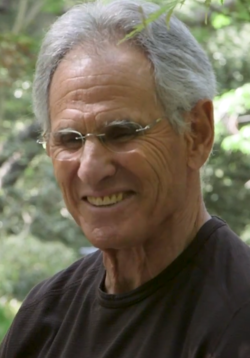While at MIT, Kabat-Zinn was a leading campaigner against military research at the university and against the Vietnam War. [6] To reduce student protests, MIT appointed him, alongside Noam Chomsky and George Katsiaficas, to an advisory panel on the future of the university's military labs. [7] During this time, he pondered his life's purpose, which he called his "karmic assignment." [8]
Career
Kabat-Zinn was first introduced to meditation by Philip Kapleau, a Zen teacher who came to speak at MIT where Kabat-Zinn was a student. Kabat-Zinn went on to study meditation with other Buddhist teachers such as Seungsahn. [9] He also studied at the Insight Meditation Society with Jack Kornfield and Joseph Goldstein, and eventually taught there. [3] [9] In 1979 he founded the Stress Reduction Clinic at the University of Massachusetts Medical School, where he adapted the Soto Zen, Vipassana, Hatha Yoga and Advaita Vedanta teachings and developed the Stress Reduction and Relaxation Program. [3] He subsequently renamed the structured eight-week course Mindfulness-Based Stress Reduction (MBSR). He removed the soteriological goals of the religious and spiritual systems that influenced the MBSR and any connection between mindfulness and Buddhism, instead putting MBSR in a scientific context. [9] [10] He subsequently also founded the Center for Mindfulness in Medicine, Health Care, and Society at the University of Massachusetts Medical School. His secular technique of Mindful Yoga, which combines meditation and yoga as exercise, has since spread worldwide. [9] The course aims to help patients cope with stress, pain, and illness by using what is called "moment-to-moment awareness." [11] [12]
Kabat-Zinn's MBSR began to get increasing notice with the publication of his first book, Full Catastrophe Living: Using the Wisdom of Your Body and Mind to Face Stress, Pain, and Illness (1991), which gave detailed instructions for the practice. [13] Then, in 1993, his work in the Stress Reduction Clinic was featured in Bill Moyers's PBS special Healing and the Mind, spurring wide interest in MBSR and helping to make Kabat-Zinn nationally famous. [9] In 1994 Kabat-Zinn's second book, titled Wherever You Go, There You Are, became a national bestseller. [14] In the latter part of the 1990s, many MBSR clinics were opened, either as standalone centers or as part of a hospital's holistic medicine program. [9]
Research by Kabat-Zinn includes the effect of MBSR on psoriasis, pain, anxiety, brain function, and immune function. [15]
He is a board member of the Mind and Life Institute, a group that organizes dialogues between the Dalai Lama and Western scientists. [16]
MBSR has been adapted for use by the US military to improve combatants' "operational effectiveness," apparently with Kabat-Zinn's approval, which has provoked some controversy among mindfulness practitioners. [17] [18] [19]
Discussing the integration of narratives into mindfulness practice, Kabat-Zinn has said, "the map... can occlude... the territory.' That is, thinking about a storyline can get in the way, like creating a mental representation 'map' rather than directly experiencing the 'territory' of the present moment.
Kabat-Zinn is Professor of Medicine Emeritus at the University of Massachusetts Medical School. [20]

